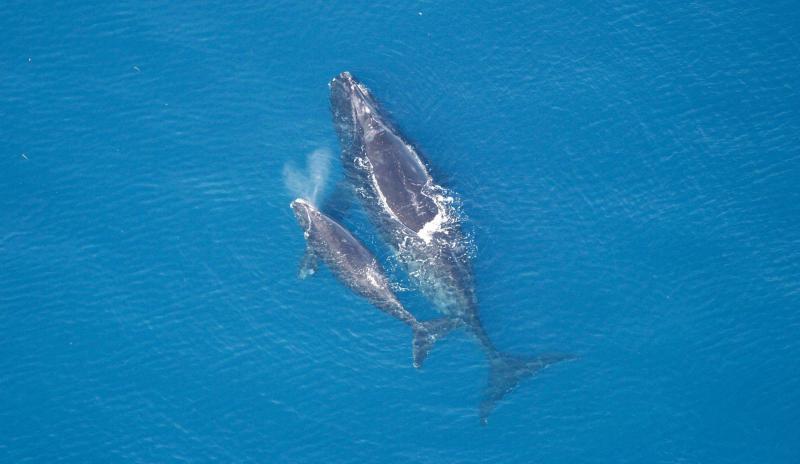
Marine mammal stocks in North Atlantic, Gulf of Mexico, Caribbean are vulnerable to climate change
by NOAA Fisheries 25 Sep 2023 21:18 UTC

A new study has classified the North Atlantic right whale stock as very highly vulnerable to climate change © NOAA Fisheries
A new study has found that a majority of marine mammal stocks managed under U.S. jurisdiction in the western North Atlantic, Gulf of Mexico, and Caribbean Sea are very highly vulnerable or highly vulnerable to climate change.
A "stock" is a group of organisms of the same species that occupy the same geographic area and interbreed when mature.
NOAA Fisheries conducts climate vulnerability assessments for coastal and marine habitats and species as part of its Climate Science Strategy. The latest vulnerability assessment for marine mammals was published today in PLOS ONE. It provides new information on the potential outlooks for these stocks in the face of a changing climate.
Key takeaways
For this study, 41 subject matter experts used a trait-based assessment that combined the exposure and sensitivity of 108 marine mammal stocks to estimate vulnerability to climate change. "Exposure" refers to the projected change in environmental conditions across a stock's geographic distribution; "sensitivity" refers to the stock's ability to tolerate and adapt to changing conditions.
Based on these criteria, each stock was assigned a climate vulnerability score. They were indexed as very highly vulnerable, highly vulnerable, moderate, or low. Climate vulnerability scores were:
- Very high: 44 percent of stocks
- High: 29 percent of stocks
- Moderate: 20 percent of stocks
- Low: 7 percent of stocks
Some of the stocks most highly vulnerable to climate change are:
- North Atlantic right whale
- Rice's whale
- Several Gulf of Mexico bay, sound, and estuary stocks of common bottlenose dolphins
All populations protected under the Endangered Species Act were found to be either very highly vulnerable or highly vulnerable to climate change. Many populations designated as either "depleted" or "strategic" under the Marine Mammal Protection Act also scored as some of the most vulnerable. Stocks that did not migrate and those that displayed tendencies to return to the same locations—known as site fidelity—were more likely to be highly vulnerable to climate change. Stocks of oceanic dolphins, such as striped dolphins in the western North Atlantic, were found to be some of the least vulnerable populations assessed.
Looking ahead
Experts predict that marine mammals will experience a high degree of climate-driven changes to their environments by mid-century. The results from this assessment can help advance research into marine mammal responses to climate change and inform the management and recovery of these stocks under changing climate conditions.
Climate change is one of a number of factors exerting pressure on marine mammal populations in the United States. Many of these species may also face threats from vessel strikes, bycatch, human-caused underwater noise, chemical pollution, and marine debris. Several of the stocks assessed as part of the study are at risk of extinction due to these non-climate factors. The paper's authors note that these stressors have the greatest potential to be addressed and managed.
"Using a systematic approach allowed us to look across all of these stocks and better understand what drives their vulnerability to climate change," says Matthew Lettrich, research associate with ECS Federal under contract to NOAA Fisheries and lead author of the publication. "We can now go out and look at some of these individual responses to climate change, and explore approaches to reduce the impacts of climate change on these vulnerable populations."
You can explore Climate Vulnerability Assessment data for marine mammals and other stocks with NOAA Fisheries' new Climate Vulnerability Assessment Tool.
Full publication and supplemental materials